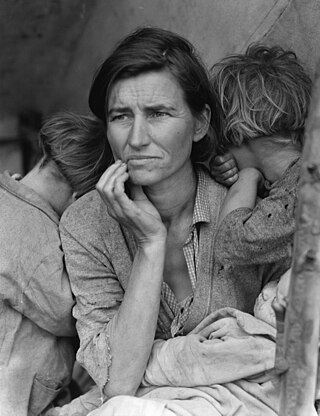An economic depression is a period of carried long-term economic downturn that is the result of lowered economic activity in one major or more national economies. Economic depression maybe related to one specific country where there is some economic crisis that has worsened but most often reflexes historically the American Great Depression and similar economic status that may be recognized as existing at some country, several countries or even in many countries. It is often understood in economics that economic crisis and the following recession that maybe named economic depression are part of economic cycles where the slowdown of the economy follows the economic growth and vice versa. It is a result of more severe economic problems or a downturn than the recession itself, which is a slowdown in economic activity over the course of the normal business cycle of growing economy.

The Tariff Act of 1930, commonly known as the Smoot–Hawley Tariff or Hawley–Smoot Tariff, was a law that implemented protectionist trade policies in the United States. Sponsored by Senator Reed Smoot and Representative Willis C. Hawley, it was signed by President Herbert Hoover on June 17, 1930. The act raised US tariffs on over 20,000 imported goods.

The Wall Street Crash of 1929, also known as the Great Crash or the Crash of '29, was a major American stock market crash that occurred in the autumn of 1929. It began in September, when share prices on the New York Stock Exchange (NYSE) collapsed, and ended in mid-November. The pivotal role of the 1920s' high-flying bull market and the subsequent catastrophic collapse of the NYSE in late 1929 is often highlighted in explanations of the causes of the worldwide Great Depression.
The Great Depression in the United Kingdom also known as the Great Slump, was a period of national economic downturn in the 1930s, which had its origins in the global Great Depression. It was Britain's largest and most profound economic depression of the 20th century. The Great Depression originated in the United States in late 1929 and quickly spread to the world. Britain did not experience the boom that had characterized the U.S., Germany, Canada and Australia in the 1920s, so its effect appeared less severe. Britain's world trade fell by half (1929–33), the output of heavy industry fell by a third, employment profits plunged in nearly all sectors. At the depth in summer 1932, registered unemployed numbered 3.5 million, and many more had only part-time employment. However at the same time, from 1929 to 1933 employment dipped only to 94.9% relative to 1929 employment metrics and recovery was seen as early at 1933. The positive trend continued across real national income and wages. New houses built increased by 33% from 1929 to 1933, while profits, prices, export volume and value, and imports volume and value dropped. Overall, while all these metrics were concerning to parliament and businessmen along with devastating industrial regions, the common person especially in areas around London did not experience major hardship and even prospered.

The causes of the Great Depression in the early 20th century in the United States have been extensively discussed by economists and remain a matter of active debate. They are part of the larger debate about economic crises and recessions. The specific economic events that took place during the Great Depression are well established.

The worldwide Great Depression of the early 1930s was a social and economic shock that left millions of Canadians unemployed, hungry and often homeless. Few countries were affected as severely as Canada during what became known as the "Dirty Thirties", due to Canada's heavy dependence on raw material and farm exports, combined with a crippling Prairies drought known as the Dust Bowl. Widespread losses of jobs and savings ultimately transformed the country by triggering the birth of social welfare, a variety of populist political movements, and a more activist role for government in the economy.

A Summons to Memphis is a 1986 novel by Peter Taylor that won the Pulitzer Prize for Fiction in 1987. It is the recollection of Phillip Carver, a middle aged editor from New York City, who is summoned back to Memphis by his two conniving unmarried sisters to help them prevent the marriage of their elderly father to a younger woman.
Elaine Tanner-Watt, is a Canadian former competition swimmer. Olympic medallist, and former world record-holder in two events.
George Samuel Clason was an American author. He is most often associated with his book The Richest Man in Babylon which was first published in 1926.
The Great Depression was a dramatic, worldwide economic downturn beginning in 1929 and lasting through most of the 1930s.

In the United States, the Great Depression began with the Wall Street Crash of October 1929 and then spread worldwide. The nadir came in 1931–1933, and recovery came in 1940. The stock market crash marked the beginning of a decade of high unemployment, poverty, low profits, deflation, plunging farm incomes, and lost opportunities for economic growth as well as for personal advancement. Altogether, there was a general loss of confidence in the economic future.

Thomas Hellman is a Canadian singer, songwriter, radio columnist, and author. Born to an American father and a French mother, he sings both in French and English.

Canada competed at the 1932 Summer Olympics in Los Angeles, United States. Despite the games being held during the Great Depression, Canada sent its second largest team to date. 102 competitors, 85 men and 17 women, took part in 69 events in 10 sports.

During the World Wars and Interwar Years, 1914–1947, Canada experienced economic gain, more freedom for women, and new technological advancements. There were severe political tensions over issues of war and ethnicity, and heavy military casualties. The Great Depression hit Canada hard, especially in export-oriented mining and farming communities, and in urban factory districts.

A Monetary History of the United States, 1867–1960 is a book written in 1963 by Nobel Prize–winning economist Milton Friedman and Anna J. Schwartz. It uses historical time series and economic analysis to argue the then-novel proposition that changes in the money supply profoundly influenced the U.S. economy, especially the behavior of economic fluctuations. The implication they draw is that changes in the money supply had unintended adverse effects, and that sound monetary policy is necessary for economic stability. Orthodox economic historians see it as one of the most influential economics books of the century. The chapter dealing with the causes of the Great Depression was published as a stand-alone book titled The Great Contraction, 1929–1933.

The Great Depression (1929–1939) was a severe global economic downturn that affected many countries across the world. It became evident after a sharp decline in stock prices in the United States, leading to a period of economic depression. The economic contagion began around September 1929 and led to the Wall Street stock market crash of 24 October. This crisis marked the start of a prolonged period of economic hardship characterized by high unemployment rates and widespread business failures.

The Great Depression is the fourth studio album by American rapper DMX. It was released on October 23, 2001 by Ruff Ryders Entertainment and Def Jam Recordings. The production on the album was handled by multiple producers including Just Blaze, Dame Grease, Black Key and DMX himself. The album also features guest appearances by Stephanie Mills, Faith Evans and Mashonda.
William Andrew "Bill" Waiser is a Canadian historian and author specializing in western and northern Canadian history.

Lords of Finance: The Bankers Who Broke the World is a nonfiction book by Liaquat Ahamed about events leading up to and culminating in the Great Depression as told through the personal histories of the heads of the Central Banks of the world's four major economies at the time: Benjamin Strong Jr. of the New York Federal Reserve, Montagu Norman of the Bank of England, Émile Moreau of the Banque de France, and Hjalmar Schacht of the Reichsbank. The text was published on January 22, 2009 by Penguin Press. The book was generally well received by critics and won the 2010 Pulitzer Prize for History. Because the book was published during the midst of the financial crisis of 2007–2010, the book subject matter was seen as very relevant to current financial events.
James George Eayrs, was a Canadian historian.











